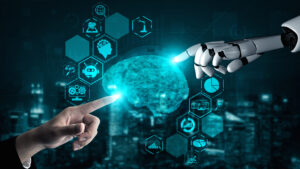
The researchers and inventors of this world have developed machines to be useful to humans in private and professional lives, in recent years probably one of the most groundbreaking developments is AI (artificial intelligence).
In this way, humans not only transferred a core element of their being into machines, but also created a new level of technology.
What does the term Artificial Intelligence actually mean?
Explained, Artificial Intelligence is the automation of intelligent behavior and engaging in machine learning. Today, there are countless technologies based on AI already: Smart Finance, Smart Factory, Smart Health, and Smart Home. Even entire smart cities are already being planned, such as the 170 km long city “The Line” in Saudi Arabia.
Particularly in times of climate change and war-related supply shortages of fossil fuels, AI becomes increasingly important. Smart grids, i.e. AI-based and thus intelligent power grids, ensure that the supply and demand for energy can be efficiently controlled. Therefore, smart grids are the basic requirement for sustainable energy systems that are supplied by renewable energies.
Almost unlimited possibilities through artificial intelligence
AI-based systems that can speak, read and see can control themselves and enable the development of “intelligent” buildings and software programs. Some of the AI systems can recognise traffic signs, house numbers and even cancer cells, enabling them to be used in various industries and areas of life.
Nowadays, AI-based translation software is already capable of translating over 70 languages accurately and fully automatically using various algorithms and machine learning. The software solution of the Swiss startup Vidby makes it possible to translate videos with the highest precision and offering unique conditions. In terms of both speed and price, Vidby´s software is well positioned in the booming market.
Virtual voice assistants like Siri or Alexa demonstrate what AI and machine learning are capable of. They can answer a wide variety of questioning and execute simple commands. On request, they switch the lights on and off, lower or raise the shutters, start the coffee machine or make a call.
Challenges for modern translation software
The developers of modern translation software had to overcome several challenges. First, it was necessary to improve the quality of translation. Previous software achieved a maximum of 50 percent translation accuracy. Thanks to AI, the accuracy of translations is between 80 and 99 percent. This applies not only to the world languages such as English. But to 70(!) languages into which the software can translate. Even with dialects like Schwyzerdütsch, Vidby´s translation software has no problems.
A second challenge was time. In our fast-paced world, everything has to be done as quickly as possible. Together with a team of 25 experts Alexander Konovalov and Eugen von Rubinberg, developed translation software for Vidby that takes just two minutes to produce a translation in the original language that is significantly higher quality because it is more accurate than, i.e., Google translate or DeepL.
The developing companies are not resting on their laurels, but are constantly trying to make their software even more efficient. For example, the software is currently working on recognizing the gender of the person speaking, perceiving the age of children to senior citizens, and even analyzing the color of the voice to determine the mood and emotion of the speaker. All three factors are considered in the translation process, so that the translation ultimately sounds even more natural and realistic.
Since many people nowadays hold meetings and appointments both privately and professionally via video conferencing, emotions that enter a translation are an important element for ensuring that the translation is as accurate as possible.
Artificial intelligence is used across all industries
Artificial intelligence is not the only component of translation solutions. It is used in banking, healthcare, industry and public services too. It helps with onboarding or the creation of monetary investment strategies for banks, as well-as with a medical diagnosis in clinics or the control of production processes in companies.
In the digital age, language and moving images are the essential components of intercultural cooperation for the building of knowledge. This is also true for content delivery. For these specific factors in particular, translation software like Vidby’s is important and useful for preserving cultural assets and enhancing cross-border understanding.
Read more:
Future-oriented technology – artificial intelligence in translation software





